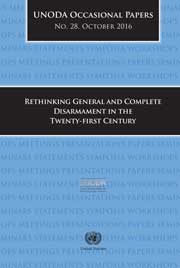 In his chapter in a new UNODA Occasional Paper on Rethinking General and Complete Disarmament, Director of Pace University’s International Disarmament Institute Matthew Bolton calls for a “discursive rehabilitation” of comprehensive approaches to disarmament:
In his chapter in a new UNODA Occasional Paper on Rethinking General and Complete Disarmament, Director of Pace University’s International Disarmament Institute Matthew Bolton calls for a “discursive rehabilitation” of comprehensive approaches to disarmament:
A rarely acknowledged irony of the post–cold war era is that it ushered in a moment when the world came closest to achieving “General and Complete Disarmament” (GCD) but, simultaneously, the concept was discursively marginalized and discredited as “unrealistic”. The sort of comprehensive disarmament envisioned by the GCD concept — reducing security forces and arsenals to no more than is needed for national safety—can now be talked about in policy circles only as something that is “done to” a former conflict zone, usually in the Global South. Reviewing the history of GCD reminds us that it was taken seriously by “serious people” and even written into international law. It allows us to pay attention to a concept that haunts the edges of our conventional wisdom about global security policy. The point is not to indulge in nostalgic “what if” counterfactuals, but to have the past challenge our present complacency and reintroduce GCD as a “thinkable thought.”
To read the whole chapter, click here.
